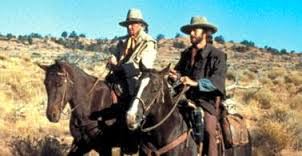SPOILER ALERT! The plot will be discussed.
Well this film definitely does not fit the typical John Wayne style
western, pilgrim. (Did Wayne actually ever say “pilgrim”? Let me know if he did).
It shows how war, especially the American Civil War, can subvert civilization. The
title alone tells you something. We're dealing with someone outside the established
system of government. He became this way when renegade Union soldiers killed his
wife and child and burned down his house. He and his family are collateral
damage in this universe. This movie shows a topsy-turvy world. There’s a lot of
that going on in 1970’s films – this one came out in 1976. Here, the Union army
is as bad as the Confederate. At first, Josey joins up with the Confederates
for revenge. But, the man who recruited him, Fletcher, becomes a traitor and,
for money, convinces everyone except Josey to surrender. After the Confederates
are double-crossed and killed, Josey kills the Union soldiers. He is now an
outlaw. Fletcher hunts Josey, probably to obliterate the person whose existence
makes him feel guilty for his own betrayal.
The actions and words of the film show the inverse reality
created by war. Josey, while placing a wood cross on his wife's grave, starts
to angrily slam it into the ground, knocking it over, as much an act of defiance
as of reverence for God. At one point, Josey says about being dragged "all
over hell's creation" – instead of using the familiar phrase "God's
creation." In this film, Josey, a
white man, joins forces with an Indian, played by Chief Dan George. When they
first encounter each other, it is the white man who sneaks up and gets the drop
on the Indian. George dressed not as a Native American but in white man's
clothes, looks like, as George says, sarcastically, a "civilized
man." The white man’s world is being satirized here.
There is a ferryman who transports Union and
Confederate passengers alternately, for money, singing Dixie ,
for Josey's sake, when ferrying him. He almost seems like Brecht's Mother
Courage, switching flags for practical purposes. In another scene, after his
identity is discovered in a town, Josey confronts Union soldiers by saying
"Are you going to pull out your pistols or whistle Dixie ,"
– not what you would think Union men would sing. But, in this world,
allegiances can fluctuate. When Josey and his new family of Native Americans,
left behind townspeople, and displaced Kansans defend their new home, the house
has crosses cut out of the windows, looking, ironically, religious, but
actually useful for shooting side to side and up and down in the last battle
with those pursuing Josey.
In the end, Josey makes peace with the local Native
Americans, saying that governments took everything from both of them, and now
peace can only be made between people – not governments. When Fletcher finally
catches up with Josey, he lets him go, as the two make an unspoken agreement,
outside the laws of governments.
This film upholds the traditional western value system which
exalts strong individualism, but, in this case, as the way to heal society.
Any other Eastwood films you would like discussed?
Next week’s film is a more recent one: The Place Beyond the Pines.


No comments:
Post a Comment
Please share your thoughts about the movies discussed here.